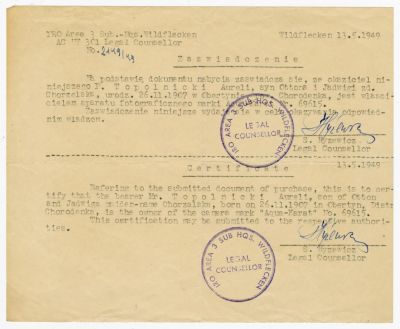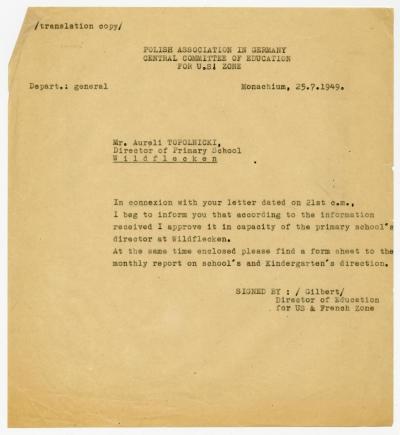The estate of Aureli Topolnicki, resident between 1945 and 1951 in the DP camp in Wildflecken (Durzyn)

On 5. March 1947 the Central Committee for Schools and Educational Affairs of the League of Poles in Germany (HQ in Munich) appointed Topolnicki as head of the Polish schools in Wildflecken-Durzyn and the surrounding district [30]. He took up the post only a few weeks later, only to break it off once again when he emigrated to Belgium on 16. June 1947 [31]. This second attempt to leave the country – Topolnicki had already worked for a short period in the Netherlands in June 1946 [32] – ended after only a few weeks when he returned to Wildflecken in August 1947[33]. On 29. August he was reappointed as a secondary school teacher there [34]. It is highly probable that Topolnicki became the head of the school in the second half of 1949 [35]. Whatever the case, at the end of 1949, in his function as headmaster, he received a letter from the International Refugee Organization (IRO) [36] telling him that the school would be closed at the end of the year at the same time as the Wildflecken-Durzyn DP camp [37]. Despite protests and the postponement of the closure, the school closed for good in April 1950 at the end of the school year [38].
Alongside his teaching duties Topolnicki was also active in other areas of camp life – amongst others he was a passionate musician and music teacher [39]. Furthermore he was an active member in numerous Polish organisations and societies in Germany. He was a member of the League of Poles in the US zone in Germany and at the same time chair of the Polish committee of the League in Wildflecken [40], a member of the Association of Polish Teachers in Exile [41] and of the Headquarters of the Polish School System in Germany [42]. In addition he and his wife were members of the Polish National Fund [43].
Topolnicki’s wife, Irma, had several jobs during their time in the DP camp in Wildflecken-Durzyn. In December 1945 she took over the administration of the canteen [44], between January 1946 and September 1947 she was a block keeper [45], from June until October 1949 she was employed as a secretary in the IRO registration office, and she was a secondary school teacher between November 1949 and April 1950 [46]. In this connection the school’s headmaster, Aureli Topolnicki, had to deal with accusations of nepotism from the staff, but these were never officially investigated [47]. In addition, between January and June 1947, Irma Topolnicka enrolled in a dressmaking course at the Women’s Professional School in Wildflecken-Durzyn [48]. Their son, Otto, attended the local secondary school between 1945 and 1950 [49]. Until then the Topolnicki family had still not succeeded in emigrating. After their failed attempts to emigrate to the Netherlands and Belgium they made a definite decision to try to emigrate to the United States. Topolnicki seems to have been perfectly clear that he had no real chance of getting a job as a teacher because of his insufficient knowledge of English, the more so because he was already 40. Since he was also interested in natural science and technology [50] he embarked on a course of electronics [51]. But over and beyond this, the Topolnickis continually tried to provide the immigration authorities in the USA with good arguments in order to be able to emigrate as quickly as possible. Thus, in March 1950, Aureli Topolnicki, persuaded the pastor of the Polish community in Wildflecken-Durzyn, Marian Świtka, to issue him with a certificate attesting that he was a “good Pole and Catholic” as well as being “industrious and of exemplary behaviour” [52]. Irma had been given a similar certificate in English and Polish two and a half years previously [53]. In addition the IRO issued Topolnicki with a report on the skills and achievements of local staff – here he was assessed as teacher – which evaluated factors like physical suitability, knowledge and skills, initiative, achievement, reliability etc. [54]
[30] Letter of appointment to the central committee for school and educational affairs in the American occupying zone – Topolnicki is made the head of the Durzyn (Wildflecken) school district, [Inheritance of Aureli Topolnicki, document no. 073].
[31] English-language work certificate for A. Topolnicki on his activities as a teacher at the primary and secondary school in Durzyn (Wildflecken) from 18.8.1945, [Inheritance of Aureli Topolnicki, document no. 009].
[32] Dutch health insurance card, issued to Topolnicki on 18.6.1946, [Inheritance of Aureli Topolnicki, document no. 107].
[33] Official order on the transport of eight Polish DPs to Wildflecken on 7.8.1947, [Inheritance of Aureli Topolnicki, document no. 016].
[34] Certificate for Aureli Topolnicki on his activities as a teacher in the Wildflecken DP camp from 29.8.1947 to 30.4.1950, [Inheritance of Aureli Topolnicki, document no. 012].
[35] A report issued in May 1949 was signed by another headmaster, see: Otto Topolnicki’s school report from the 4. class, dated 21.5.1949, [Inheritance of Aureli Topolnicki, document no. 060]; another letter dated 25.7.1949 is, however, addressed to Topolnicki as the headmaster, see: the reply of the Director of Education for US & French Zone to a letter from A. Topolnicki (in his function as headmaster), [Inheritance of Aureli Topolnicki, document no. 070].
[36] The International Refugee Organization was set up in 1946, and in 1947 it replaced the United Nations Relief and Rehabilitation Administration (UNRRA) and took over responsibility for administrating the DP camp and caring for displaced persons on German territory. This did not prevent the IRO’s work from suffering from a continual decrease in funding and this was mirrored in the DP school system. The IRO stopped its work in 1952 after most of the DPs had either been repatriated or had found a new home in other countries abroad.
[37] A letter from the IRO Welfare Officers to the headmaster A. Topolnicki on the closure of the school in Durzyn (Wildflecken) because of the closure of the camp on 30.12.1949, [Inheritance of Aureli Topolnicki, document no. 066]; as early as summer 1949 the Wildflecken-Durzyn DP camp was used as a transit camp for DPs of different nationalities as well as for work places for DPs working in the camp. Polish self administration in the camp simultaneously came to an end, see: Farewell letter from the Polish head of the DP camp to the Polish residents in Durzyn, [Inheritance of Aureli Topolnicki, document no. 107].
[38] Letter written by the IRO Welfare Officer, dated 03.03.1950, to the headmaster A. Topolnicki on the reappointment of teachers to the school in Durzyn (Wildflecken), dated 1.2.1950, [Inheritance of Aureli Topolnicki, document no. 067]: certificate issued to Aureli Topolnicki dated 14.07.1950 on his activities as a teacher in the Wildflecken DP camp from 29.8.1947 to 30.4.1950, [Inheritance of Aureli Topolnicki, document no. 012].
[39] Telephone interview with Barbara Karbarz, dated 18.03.2017.
[40] A. Topolnicki’s membership card of the Polish Union in the US zone in Germany, dated 1.5.1950, [Inheritance of Aureli Topolnicki, document no. 110].
[41] Topolnicki’s membership card of the Union of Polish Teachers in Exile in Germany, with a photograph, dated 15.5.1947, [Inheritance of Aureli Topolnicki, document no. 112].
[42] Topolnicki’s identification card on his membership of the Headquarters of the Polish school system in Germany, valid until 31.07.1946, [Inheritance of Aureli Topolnicki, document no. 126]
[43] The National Fund was set up on the basis of a presidential decree, dated 14.11.1949, with the aim of generating funds to strengthen the independence of Poland and promote the national culture and education of Poles in exile. Identity cards of Aureli and Irma Topolnicki showing their membership in the Polish National Fund , [Inheritance of Aureli Topolnicki, Dokumente no. 122 und 132].
[44] Certificate on the appointment of Frau (sic!) Aurelia Topolnicka as canteen administrator (it clearly meant Irma Topolnicka) dated 05.12.1945, [Inheritance of Aureli Topolnicki, document no. 088].
[45] Employment certificate as block supervisor issued by the administration department, dated from 1.1.1945 (1946) to 14.9.1947, and handed to Irma Topolnicka, [Inheritance of Aureli Topolnicki, document no. 080].
[46] Irma Topolnicki’s employment certificate as a secretary in the IRO registration office in the US zone Staging Center, Wildflecken (1.6.49-31.10.49) and as a schoolteacher (1.11.49-30.4.50), [Inheritance of Aureli Topolnicki, document no. 079].
[47] Undated letter from the school staff (Durzyn-Wildflecken) accusing Aureli Topolnicki of nepotism and poor leadership. [Inheritance of Aureli Topolnicki, document no. 083].
[48] Certificate of a six-month tailor’s course, dated 1.1.1947 to 30.6.1947, followed by Irma Topolnicka at the Women's Professional School in Durzyn-Wildflecken, [Inheritance of Aureli Topolnicki, document no. 078].
[49] Otto Topolnicki’s school certificates from the 1. to the 5. class at the school in Wildflecken-Durzyn, [Inheritance of Aureli Topolnicki, document no. 058–062 ].
[50] Alongside the already mentioned subjects there is written proof of his strong work in physics, chemistry and drawing. [Inheritance of Aureli Topolnicki, document no. 097]; during his stay in the DP camp he was one of the few DPs to possess a radio receiver and a camera. [Inheritance of Aureli Topolnicki, Dokumente no. 020, 028, 032, 037].
[51] Certificate of the IRO preparation committee on a training measure completed with a test, and Aureli Topolnicki’s categorisation as a "2. grade/class electrician", dated 13.05.1948, [Inheritance of Aureli Topolnicki, document no. 003].
[52] Morality confirmation for Aureli Topolnicki, dated 05.03.1950, [Inheritance of Aureli Topolnicki, document no. 105; English version no. 019].
[53] Morality confirmation for Irma Topolnicka, dated 06.10.1947, [Inheritance of Aureli Topolnicki, document no. 096].
[54] Evaluation report on the skills and achievements of local people regarding the person of Aureli Topolnicki, dated 30.03.1949, [Inheritance of Aureli Topolnicki, document no. 013]









































![Document no. 35/1 Document no. 35/1 - Handwritten letter [in Polish] from M. Paledog from Cheltenham/England to A. Topolnicki.](/sites/default/files/styles/width_100_tiles/public/assets/images/12890-031-1a.jpg?itok=gfPskEix)
![Document no. 35/2 Document no. 35/2 - Handwritten letter from M. Paledog from Cheltenham/England to A. Topolnicki, [p. 2].](/sites/default/files/styles/width_100_tiles/public/assets/images/12890-031-1b.jpg?itok=Df4ctKpD)
![Document no. 36/1 Document no. 36/1 - Envelope to the letter [Document 35] from Paledog to Topolnicki.](/sites/default/files/styles/width_100_tiles/public/assets/images/12890-031-2a.jpg?itok=krd42nL9)
![Document no. 36/2 Document no. 36/2 - Back of the envelope to the letter [Document 35] from Paledog to Topolnicki.](/sites/default/files/styles/width_100_tiles/public/assets/images/12890-031-2b.jpg?itok=K_dTfhNe)

![Document no. 38 Document no. 38 - Topolnicki is informed about the progress of his immigration application [ assurance is recognised].](/sites/default/files/styles/width_100_tiles/public/assets/images/12890-033.jpg?itok=OKjuXvyn)
![Document no. 39 Document no. 39 - [Handwritten copy of the] birth certificate of Irma Saling, the wife of Aureli Topolnicki.](/sites/default/files/styles/width_100_tiles/public/assets/images/12890-034-1.jpg?itok=Qcvw5Oaz)











































































































































![Dokument Nr. 127/1 Dokument Nr. 127/1 - Personalausweis von A. Topolnicki mit Lichtbild und Informationen zur Person und Aussehen, zudem Information über die Deportation nach Lungenburg [Lundenburg] am 16.7.1943](/sites/default/files/styles/width_100_tiles/public/assets/images/12890-096a.jpg?itok=pKJpAuzw)
![Dokument Nr. 127/2 Dokument Nr. 127/2 - Personalausweis von A. Topolnicki mit Lichtbild und Informationen zur Person und Aussehen, zudem Information über die Deportation nach Lungenburg [Lundenburg] am 16.7.1943.](/sites/default/files/styles/width_100_tiles/public/assets/images/12890-097b.jpg?itok=RIjcT74Q)




















































